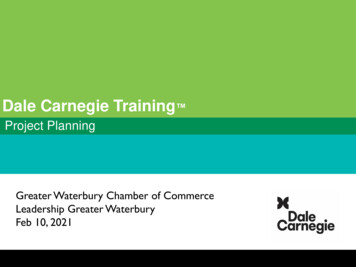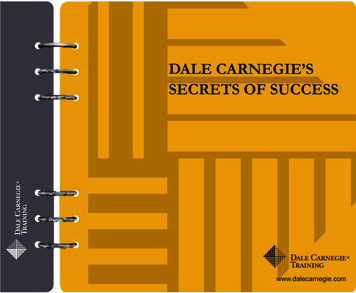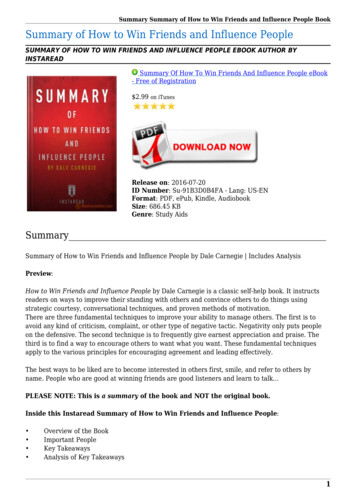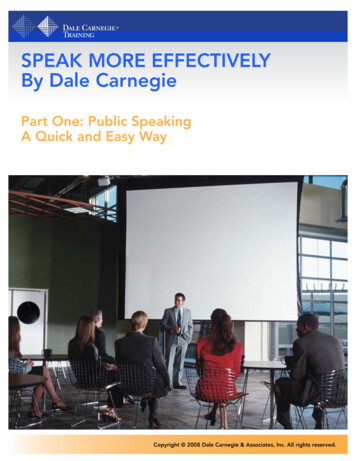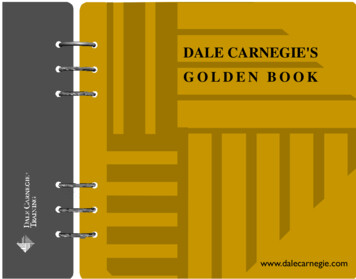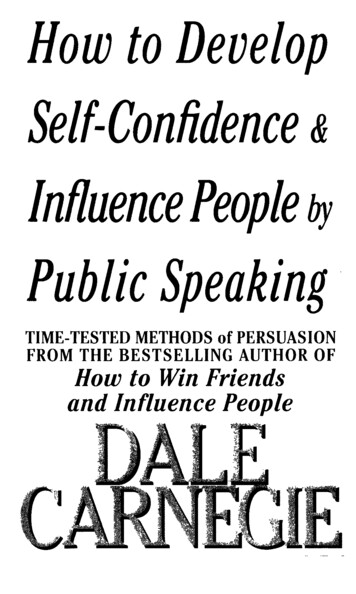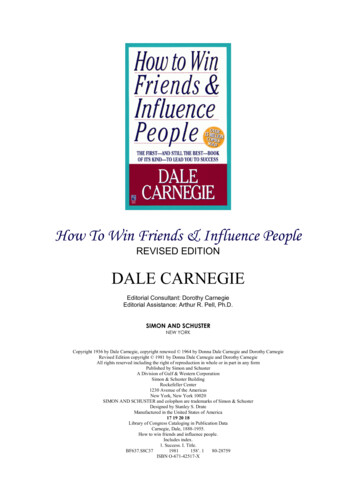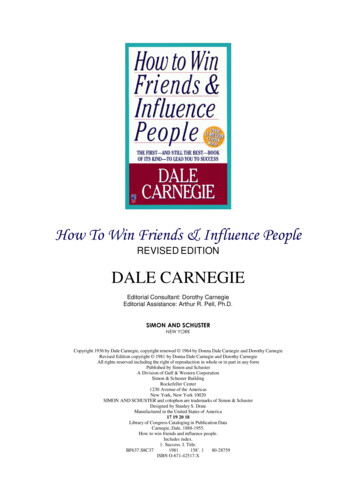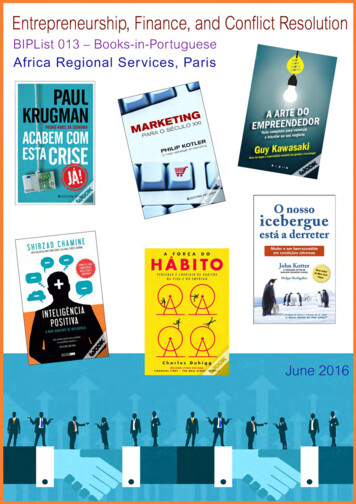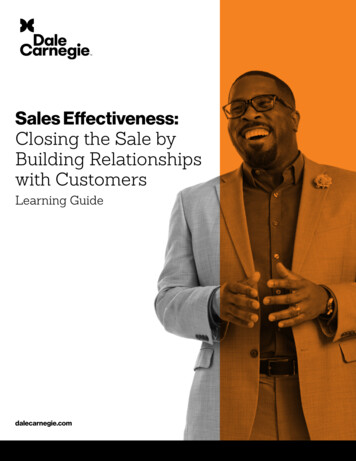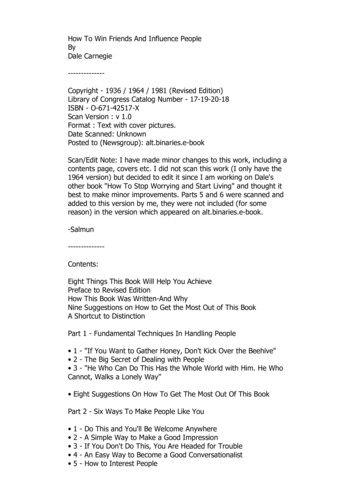
Transcription
How To Win Friends And Influence PeopleByDale Carnegie-------------Copyright - 1936 / 1964 / 1981 (Revised Edition)Library of Congress Catalog Number - 17-19-20-18ISBN - O-671-42517-XScan Version : v 1.0Format : Text with cover pictures.Date Scanned: UnknownPosted to (Newsgroup): alt.binaries.e-bookScan/Edit Note: I have made minor changes to this work, including acontents page, covers etc. I did not scan this work (I only have the1964 version) but decided to edit it since I am working on Dale'sother book "How To Stop Worrying and Start Living" and thought itbest to make minor improvements. Parts 5 and 6 were scanned andadded to this version by me, they were not included (for somereason) in the version which appeared on ight Things This Book Will Help You AchievePreface to Revised EditionHow This Book Was Written-And WhyNine Suggestions on How to Get the Most Out of This BookA Shortcut to DistinctionPart 1 - Fundamental Techniques In Handling People 1 - "If You Want to Gather Honey, Don't Kick Over the Beehive" 2 - The Big Secret of Dealing with People 3 - "He Who Can Do This Has the Whole World with Him. He WhoCannot, Walks a Lonely Way" Eight Suggestions On How To Get The Most Out Of This BookPart 2 - Six Ways To Make People Like You 12345-Do This and You'll Be Welcome AnywhereA Simple Way to Make a Good ImpressionIf You Don't Do This, You Are Headed for TroubleAn Easy Way to Become a Good ConversationalistHow to Interest People
6 - How To Make People Like You Instantly In A NutshellPart 3 - Twelve Ways To Win People To Your Way Of Thinking 1 - You Can't Win an Argument2 - A Sure Way of Making Enemies—and How to Avoid It3 - If You're Wrong, Admit It4 - The High Road to a Man's Reason5 - The Secret of Socrates6 - The Safety Valve in Handling Complaints7 - How to Get Co-operation8 - A Formula That Will Work Wonders for You9 - What Everybody Wants10 - An Appeal That Everybody Likes11 - The Movies Do It. Radio Does It. Why Don't You Do It?12 - When Nothing Else Works, Try ThisIn A NutshellPart 4 - Nine Ways To Change People Without Giving Offence OrArousing Resentment 1 - If You Must Find Fault, This Is the Way to Begin2 - How to Criticize—and Not Be Hated for It3 - Talk About Your Own Mistakes First4 - No One Likes to Take Orders5 - Let the Other Man Save His Face6 - How to Spur Men on to Success7 - Give the Dog a Good Name8 - Make the Fault Seem Easy to Correct9 - Making People Glad to Do What You WantIn A NutshellPart 5 - Letters That Produced Miraculous ResultsPart 6 - Seven Rules For Making Your Home Life Happier 1 - How to Dig Your Marital Grave in the Quickest Possible Way2 - Love and Let Live3 - Do This and You'll Be Looking Up the Time-Tables to Reno4 - A Quick Way to Make Everybody Happy5 - They Mean So Much to a Woman6 - If you Want to be Happy, Don't Neglect This One7 - Don't Be a "Marriage Illiterate"In A Nutshell-------------Eight Things This Book Will Help You Achieve
1. Get out of a mental rut, think new thoughts, acquire newvisions, discover new ambitions. 2. Make friends quickly and easily. 3. Increase your popularity. 4. Win people to your way of thinking. 5. Increase your influence, your prestige, your ability to get thingsdone. 6. Handle complaints, avoid arguments, keep your human contactssmooth and pleasant. 7. Become a better speaker, a more entertaining conversationalist. 8. Arouse enthusiasm among your associates.This book has done all these things for more than ten million readersin thirty-six languages.-------------Preface to Revised EditionHow to Win Friends and Influence People was first published in 1937in an edition of only five thousand copies. Neither Dale Carnegie northe publishers, Simon and Schuster, anticipated more than thismodest sale. To their amazement, the book became an overnightsensation, and edition after edition rolled off the presses to keep upwith the increasing public demand. Now to Win Friends andInfEuence People took its place in publishing history as one of theall-time international best-sellers. It touched a nerve and filled ahuman need that was more than a faddish phenomenon of postDepression days, as evidenced by its continued and uninterruptedsales into the eighties, almost half a century later.Dale Carnegie used to say that it was easier to make a million dollarsthan to put a phrase into the English language. How to Win Friendsand Influence People became such a phrase, quoted, paraphrased,parodied, used in innumerable contexts from political cartoon tonovels. The book itself was translated into almost every knownwritten language. Each generation has discovered it anew and hasfound it relevant.Which brings us to the logical question: Why revise a book that hasproven and continues to prove its vigorous and universal appeal?Why tamper with success?To answer that, we must realize that Dale Carnegie himself was atireless reviser of his own work during his lifetime. How to WinFriends and Influence People was written to be used as a textbookfor his courses in Effective Speaking and Human Relations and is stillused in those courses today. Until his death in 1955 he constantlyimproved and revised the course itself to make it applicable to theevolving needs of an every-growing public. No one was more
sensitive to the changing currents of present-day life than DaleCarnegie. He constantly improved and refined his methods ofteaching; he updated his book on Effective Speaking several times.Had he lived longer, he himself would have revised How to WinFriends and Influence People to better reflect the changes that havetaken place in the world since the thirties.Many of the names of prominent people in the book, well known atthe time of first publication, are no longer recognized by many oftoday's readers. Certain examples and phrases seem as quaint anddated in our social climate as those in a Victorian novel. Theimportant message and overall impact of the book is weakened tothat extent.Our purpose, therefore, in this revision is to clarify and strengthenthe book for a modern reader without tampering with the content.We have not "changed" How to Win Friends and Influence Peopleexcept to make a few excisions and add a few more contemporaryexamples. The brash, breezy Carnegie style is intact-even the thirtiesslang is still there. Dale Carnegie wrote as he spoke, in an intensivelyexuberant, colloquial, conversational manner.So his voice still speaks as forcefully as ever, in the book and in hiswork. Thousands of people all over the world are being trained inCarnegie courses in increasing numbers each year. And otherthousands are reading and studying How to Win Friends andlnfluence People and being inspired to use its principles to bettertheir lives. To all of them, we offer this revision in the spirit of thehoning and polishing of a finely made tool.Dorothy Carnegie (Mrs. Dale Carnegie)-------------------------How This Book Was Written-And WhybyDale CarnegieDuring the first thirty-five years of the twentieth century, thepublishing houses of America printed more than a fifth of a milliondifferent books. Most of them were deadly dull, and many werefinancial failures. "Many," did I say? The president of one of thelargest publishing houses in the world confessed to me that hiscompany, after seventy-five years of publishing experience, still lostmoney on seven out of every eight books it published.Why, then, did I have the temerity to write another book? And, afterI had written it, why should you bother to read it?Fair questions, both; and I'll try to answer them.
I have, since 1912, been conducting educational courses for businessand professional men and women in New York. At first, I conductedcourses in public speaking only - courses designed to train adults, byactual experience, to think on their feet and express their ideas withmore clarity, more effectiveness and more poise, both in businessinterviews and before groups.But gradually, as the seasons passed, I realized that as sorely asthese adults needed training in effective speaking, they needed stillmore training in the fine art of getting along with people in everydaybusiness and social contacts.I also gradually realized that I was sorely in need of such trainingmyself. As I look back across the years, I am appalled at my ownfrequent lack of finesse and understanding. How I wish a book suchas this had been placed in my hands twenty years ago! What apriceless boon it would have been.Dealing with people is probably the biggest problem you face,especially if you are in business. Yes, and that is also true if you area housewife, architect or engineer. Research done a few years agounder the auspices of the Carnegie Foundation for the Advancementof Teaching uncovered a most important and significant fact - a factlater confirmed by additional studies made at the Carnegie Instituteof Technology. These investigations revealed that even in suchtechnical lines as engineering, about 15 percent of one's financialsuccess is due to one's technical knowledge and about 85 percent isdue to skill in human engineering-to personality and the ability tolead people.For many years, I conducted courses each season at the Engineers'Club of Philadelphia, and also courses for the New York Chapter ofthe American Institute of Electrical Engineers. A total of probablymore than fifteen hundred engineers have passed through myclasses. They came to me because they had finally realized, afteryears of observation and experience, that the highest-paid personnelin engineering are frequently not those who know the most aboutengineering. One can for example, hire mere technical ability inengineering, accountancy, architecture or any other profession atnominal salaries. But the person who has technical knowledge plusthe ability to express ideas, to assume leadership, and to arouseenthusiasm among people-that person is headed for higher earningpower.In the heyday of his activity, John D. Rockefeller said that "the abilityto deal with people is as purchasable a commodity as sugar orcoffee." "And I will pay more for that ability," said John D., "than forany other under the sun."
Wouldn't you suppose that every college in the land would conductcourses to develop the highest-priced ability under the sun? But ifthere is just one practical, common-sense course of that kind givenfor adults in even one college in the land, it has escaped myattention up to the present writing.The University of Chicago and the United Y.M.C.A. Schools conducteda survey to determine what adults want to study.That survey cost 25,000 and took two years. The last part of thesurvey was made in Meriden, Connecticut. It had been chosen as atypical American town. Every adult in Meriden was interviewed andrequested to answer 156 questions-questions such as "What is yourbusiness or profession? Your education? How do you spend yourspare time? What is your income? Your hobbies? Your ambitions?Your problems? What subjects are you most interested in studying?"And so on. That survey revealed that health is the prime interest ofadults and that their second interest is people; how to understandand get along with people; how to make people like you; and how towin others to your way of thinking.So the committee conducting this survey resolved to conduct such acourse for adults in Meriden. They searched diligently for a practicaltextbook on the subject and found-not one. Finally they approachedone of the world's outstanding authorities on adult education andasked him if he knew of any book that met the needs of this group."No," he replied, "I know what those adults want. But the book theyneed has never been written."I knew from experience that this statement was true, for I myselfhad been searching for years to discover a practical, workinghandbook on human relations.Since no such book existed, I have tried to write one for use in myown courses. And here it is. I hope you like it.In preparation for this book, I read everything that I could find onthe subject- everything from newspaper columns, magazine articles,records of the family courts, the writings of the old philosophers andthe new psychologists. In addition, I hired a trained researcher tospend one and a half years in various libraries reading everything Ihad missed, plowing through erudite tomes on psychology, poringover hundreds of magazine articles, searching through countlessbiographies, trying to ascertain how the great leaders of all ages haddealt with people. We read their biographies, We read the life storiesof all great leaders from Julius Caesar to Thomas Edison. I recall thatwe read over one hundred biographies of Theodore Roosevelt alone.We were determined to spare no time, no expense, to discover everypractical idea that anyone had ever used throughout the ages forwinning friends and influencing people.
I personally interviewed scores of successful people, some of themworld-famous-inventors like Marconi and Edison; political leaders likeFranklin D. Roosevelt and James Farley; business leaders like OwenD. Young; movie stars like Clark Gable and Mary Pickford; andexplorers like Martin Johnson-and tried to discover the techniquesthey used in human relations.From all this material, I prepared a short talk. I called it "How to WinFriends and Influence People." I say "short." It was short in thebeginning, but it soon expanded to a lecture that consumed onehour and thirty minutes. For years, I gave this talk each season tothe adults in the Carnegie Institute courses in New York.I gave the talk and urged the listeners to go out and test it in theirbusiness and social contacts, and then come back to class and speakabout their experiences and the results they had achieved. What aninteresting assignment! These men and women, hungry for selfimprovement, were fascinated by the idea of working in a new kindof laboratory - the first and only laboratory of human relationshipsfor adults that had ever existed.This book wasn't written in the usual sense of the word. It grew as achild grows. It grew and developed out of that laboratory, out of theexperiences of thousands of adults.Years ago, we started with a set of rules printed on a card no largerthan a postcard. The next season we printed a larger card, then aleaflet, then a series of booklets, each one expanding in size andscope. After fifteen years of experiment and research came thisbook.The rules we have set down here are not mere theories orguesswork. They work like magic. Incredible as it sounds, I haveseen the application of these principles literally revolutionize the livesof many people.To illustrate: A man with 314 employees joined one of these courses.For years, he had driven and criticized and condemned hisemployees without stint or discretion. Kindness, words ofappreciation and encouragement were alien to his lips. After studyingthe principles discussed in this book, this employer sharply alteredhis philosophy of life. His organization is now inspired with a newloyalty, a new enthusiasm, a new spirit of team-work. Three hundredand fourteen enemies have been turned into 314 friends. As heproudly said in a speech before the class: "When I used to walkthrough my establishment, no one greeted me. My employeesactually looked the other way when they saw me approaching. Butnow they are all my friends and even the janitor calls me by my firstname."
This employer gained more profit, more leisure and -what is infinitelymore important-he found far more happiness in his business and inhis home.Countless numbers of salespeople have sharply increased their salesby the use of these principles. Many have opened up new accounts accounts that they had formerly solicited in vain. Executives havebeen given increased authority, increased pay. One executivereported a large increase in salary because he applied these truths.Another, an executive in the Philadelphia Gas Works Company, wasslated for demotion when he was sixty-five because of hisbelligerence, because of his inability to lead people skillfully. Thistraining not only saved him from the demotion but brought him apromotion with increased pay.On innumerable occasions, spouses attending the banquet given atthe end of the course have told me that their homes have beenmuch happier since their husbands or wives started this training.People are frequently astonished at the new results they achieve. Itall seems like magic. In some cases, in their enthusiasm, they havetelephoned me at my home on Sundays because they couldn't waitforty-eight hours to report their achievements at the regular sessionof the course.One man was so stirred by a talk on these principles that he sat farinto the night discussing them with other members of the class. Atthree o'clock in the morning, the others went home. But he was soshaken by a realization of his own mistakes, so inspired by the vistaof a new and richer world opening before him, that he was unable tosleep. He didn't sleep that night or the next day or the next night.Who was he? A naive, untrained individual ready to gush over anynew theory that came along? No, Far from it. He was a sophisticated,blasй dealer in art, very much the man about town, who spoke threelanguages fluently and was a graduate of two European universities.While writing this chapter, I received a letter from a German of theold school, an aristocrat whose forebears had served for generationsas professional army officers under the Hohenzollerns. His letter,written from a transatlantic steamer, telling about the application ofthese principles, rose almost to a religious fervor.Another man, an old New Yorker, a Harvard graduate, a wealthyman, the owner of a large carpet factory, declared he had learnedmore in fourteen weeks through this system of training about thefine art of influencing people than he had learned about the samesubject during his four years in college. Absurd? Laughable?Fantastic? Of course, you are privileged to dismiss this statement
with whatever adjective you wish. I am merely reporting, withoutcomment, a declaration made by a conservative and eminentlysuccessful Harvard graduate in a public address to approximately sixhundred people at the Yale Club in New York on the evening ofThursday, February 23, 1933."Compared to what we ought to be," said the famous ProfessorWilliam James of Harvard, "compared to what we ought to be, weare only half awake. We are making use of only a small part of ourphysical and mental resources. Stating the thing broadly, the humanindividual thus lives far within his limits. He possesses powers ofvarious sorts which he habitually fails to use,"Those powers which you "habitually fail to use"! The sole purpose ofthis book is to help you discover, develop and profit by thosedormant and unused assets,"Education," said Dr. John G. Hibben, former president of PrincetonUniversity, "is the ability to meet life's situations,"If by the time you have finished reading the first three chapters ofthis book- if you aren't then a little better equipped to meet life'ssituations, then I shall consider this book to be a total failure so faras you are concerned. For "the great aim of education," said HerbertSpencer, "is not knowledge but action."And this is an action book.DALE CARNEGIE 1936---------------------------------Nine Suggestions on How to Get the Most Out of This Book1. If you wish to get the most out of this book, there is oneindispensable requirement, one essential infinitely more importantthan any rule or technique. Unless you have this one fundamentalrequisite, a thousand rules on how to study will avail little, And if youdo have this cardinal endowment, then you can achieve wonderswithout reading any suggestions for getting the most out of a book.What is this magic requirement? Just this: a deep, driving desire tolearn, a vigorous determination to increase your ability to deal withpeople.How can you develop such an urge? By constantly reminding yourselfhow important these principles are to you. Picture to yourself howtheir mastery will aid you in leading a richer, fuller, happier and morefulfilling life. Say to yourself over and over: "My popularity, my
happiness and sense of worth depend to no small extent upon myskill in dealing with people."2. Read each chapter rapidly at first to get a bird's-eye view of it.You will probably be tempted then to rush on to the next one. Butdon't - unless you are reading merely for entertainment. But if youare reading because you want to increase your skill in humanrelations, then go back and reread each chapter thoroughly. In thelong run, this will mean saving time and getting results.3. Stop frequently in your reading to think over what you arereading. Ask yourself just how and when you can apply eachsuggestion.4. Read with a crayon, pencil, pen, magic marker or highlighter inyour hand. When you come across a suggestion that you feel youcan use, draw a line beside it. If it is a four-star suggestion, thenunderscore every sentence or highlight it, or mark it with "****."Marking and underscoring a book makes it more interesting, and fareasier to review rapidly.5. I knew a woman who had been office manager for a largeinsurance concern for fifteen years. Every month, she read all theinsurance contracts her company had issued that month. Yes, sheread many of the same contracts over month after month, year afteryear. Why? Because experience had taught her that that was theonly way she could keep their provisions clearly in mind. I once spentalmost two years writing a book on public speaking and yet I found Ihad to keep going back over it from time to time in order toremember what I had written in my own book. The rapidity withwhich we forget is astonishing.So, if you want to get a real, lasting benefit out of this book, don'timagine that skimming through it once will suffice. After reading itthoroughly, you ought to spend a few hours reviewing it everymonth, Keep it on your desk in front of you every day. Glancethrough it often. Keep constantly impressing yourself with the richpossibilities for improvement that still lie in the offing. Rememberthat the use of these principles can be made habitual only by aconstant and vigorous campaign of review and application. There isno other way.6. Bernard Shaw once remarked: "If you teach a man anything, hewill never learn." Shaw was right. Learning is an active process. Welearn by doing. So, if you desire to master the principles you arestudying in this book, do something about them. Apply these rules atevery opportunity. If you don't you will forget them quickly. Onlyknowledge that is used sticks in your mind.
You will probably find it difficult to apply these suggestions all thetime. I know because I wrote the book, and yet frequently I found itdifficult to apply everything I advocated. For example, when you aredispleased, it is much easier to criticize and condemn than it is to tryto understand the other person's viewpoint. It is frequently easier tofind fault than to find praise. It is more natural to talk about whatvou want than to talk about what the other person wants. And so on,So, as you read this book, remember that you are not merely tryingto acquire information. You are attempting to form new habits. Ahyes, you are attempting a new way of life. That will require time andpersistence and daily application.So refer to these pages often. Regard this as a working handbook onhuman relations; and whenever you are confronted with somespecific problem - such as handling a child, winning your spouse toyour way of thinking, or satisfying an irritated customer - hesitateabout doing the natural thing, the impulsive thing. This is usuallywrong. Instead, turn to these pages and review the paragraphs youhave underscored. Then try these new ways and watch them achievemagic for you.7. Offer your spouse, your child or some business associate a dimeor a dollar every time he or she catches you violating a certainprinciple. Make a lively game out of mastering these rules.8. The president of an important Wall Street bank once described, ina talk before one of my classes, a highly efficient system he used forself-improvement. This man had little formal schooling; yet he hadbecome one of the most important financiers in America, and heconfessed that he owed most of his success to the constantapplication of his homemade system. This is what he does, I'll put itin his own words as accurately as I can remember."For years I have kept an engagement book showing all theappointments I had during the day. My family never made any plansfor me on Saturday night, for the family knew that I devoted a partof each Saturday evening to the illuminating process of selfexamination and review and appraisal. After dinner I went off bymyself, opened my engagement book, and thought over all theinterviews, discussions and meetings that had taken place during theweek. I asked myself:'What mistakes did I make that time?' 'What did I do that was rightand in what way could I have improved my performance?' 'Whatlessons can I learn from that experience?'"I often found that this weekly review made me very unhappy. I wasfrequently astonished at my own blunders. Of course, as the yearspassed, these blunders became less frequent. Sometimes I wasinclined to pat myself on the back a little after one of these sessions.
This system of self-analysis, self-education, continued year afteryear, did more for me than any other one thing I have everattempted."It helped me improve my ability to make decisions - and it aided meenormously in all my contacts with people. I cannot recommend ittoo highly."Why not use a similar system to check up on your application of theprinciples discussed in this book? If you do, two things will result.First, you will find yourself engaged in an educational process that isboth intriguing and priceless.Second, you will find that your ability to meet and deal with peoplewill grow enormously.9. You will find at the end of this book several blank pages on whichyou should record your triumphs in the application of theseprinciples. Be specific. Give names, dates, results. Keeping such arecord will inspire you to greater efforts; and how fascinating theseentries will be when you chance upon them some evening years fromnow!In order to get the most out of this book: a. Develop a deep, driving desire to master the principles of humanrelations, b. Read each chapter twice before going on to the next one. c. As you read, stop frequently to ask yourself how you can applyeach suggestion. d. Underscore each important idea. e. Review this book each month. f. Apply these principles at every opportunity. Use this volume as aworking handbook to help you solve your daily problems. g. Make a lively game out of your learning by offering some frienda dime or a dollar every time he or she catches you violating one ofthese principles. h. Check up each week on the progress you are mak-ing. Askyourself what mistakes you have made, what improvement, whatlessons you have learned for the future. i. Keep notes in the back of this book showing how and when youhave applied these principles.-----------------------------A Shortcut to Distinctionby Lowell Thomas
This biographical information about Dale Carnegie was written as anintroduction to the original edition of How to Win Friends andInfluence People. It is reprinted in this edition to give the readersadditional background on Dale Carnegie.It was a cold January night in 1935, but the weather couldn't keepthem away. Two thousand five hundred men and women throngedinto the grand ballroom of the Hotel Pennsylvania in New York. Everyavailable seat was filled by half-past seven. At eight o'clock, theeager crowd was still pouring in. The spacious balcony was soonjammed. Presently even standing space was at a premium, andhundreds of people, tired after navigating a day in business, stoodup for an hour and a half that night to witness - what?A fashion show?A six-day bicycle race or a personal appearance by Clark Gable?No. These people had been lured there by a newspaper ad. Twoevenings previously, they had seen this full-page announcement inthe New York Sun staring them in the face:Learn to Speak Effectively Prepare for LeadershipOld stuff? Yes, but believe it or not, in the most sophisticated townon earth, during a depression with 20 percent of the population onrelief, twenty-five hundred people had left their homes and hustledto the hotel in response to that ad.The people who responded were of the upper economic strata executives, employers and professionals.These men and women had come to hear the opening gun of anultramodern, ultrapractical course in "Effective Speaking andInfluencing Men in Business"- a course given by the Dale CarnegieInstitute of Effective Speaking and Human Relations.Why were they there, these twenty-five hundred business men andwomen?Because of a sudden hunger for more education because of thedepression?Apparently not, for this same course had been playing to packedhouses in New York City every season for the preceding twenty-fouryears. During that time, more than fifteen thousand business andprofessional people had been trained by Dale Carnegie. Even large,skeptical, conservative organizations such as the Westinghouse
Electric Company, the McGraw-Hill Publishing Company, the BrooklynUnion Gas Company, the Brooklyn Chamber of Commerce, theAmerican Institute of Electrical Engineers and the New YorkTelephone Company have had this training conducted in their ownoffices for the benefit of their members and executives.The fact that these people, ten or twenty years after leaving gradeschool, high school or college, come and take this training is aglaring commentary on the shocking deficiencies of our educationalsystem.What do adults really want to study? That is an important quest
Carnegie courses in increasing numbers each year. And other thousands are reading and studying How to Win Friends and lnfluence People and being inspired to use its principles to better their lives. To all of them, we offer this revision in the spirit of the honing and polishing of a finely made tool. Dorothy Carnegie (Mrs. Dale Carnegie)
